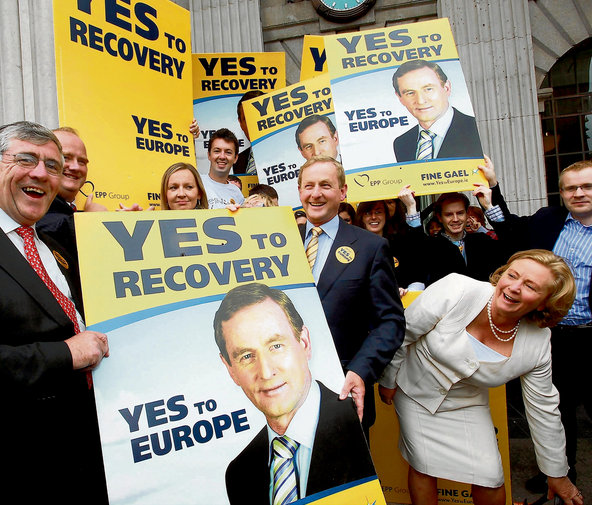| Irish Forums Message Discussion :: Fine Gael Labour coalition experienced in corruption |
   | Irish Forums :: The Irish Message
Forums About Ireland and the Irish Community, For the Irish home and Abroad. Forums include- Irish Music, Irish History, The Irish Diaspora, Irish Culture, Irish Sports, Astrology, Mystic, Irish Ancestry, Genealogy, Irish Travel, Irish Reunited and Craic
|  
|
Fine Gael Labour coalition experienced in corruption
 

|
|
|
| Irish
Author |
Fine Gael Labour coalition experienced in corruption Sceala Irish Craic Forum Irish Message |
|
bamboozileer
Sceala Philosopher
Location: Dublin
|
| Sceala Irish Craic Forum Discussion:
Fine Gael Labour coalition experienced in corruption
|
|
|
Fine Fail will soon enough be gone.
Unfortunately Biffo will be replaced by someone just as incompetent, just as unreliable, and even more of a EU Yes man. Enda Kenny will prove a embarrassment, because he is a complete EU Yes man, and his shower are every bit as parish pump incompetent and corrupt.
Fine Gael will be no different, they may even be worse. Historically they always have been. We know Fine Gael will support the banks over the people, because they have form.
The last time a Fine Gael Labour coalition had power, they also supported the banks over the Irish people. The Fine Gael Labour coalition nearly bankrupted Ireland in 1985.
We need hope, not more incestuous politics and the offspring of arrogant wealthy fools.
Beware Fine Gael EU cheerleaders and liars, Lisbon treaty and the lies of Fine Gael.

Ireland bankrupt under the last Fine Gael Labour Coalition of form
Deja vu
The Fine Gael Labour coalition will at least have first hand experience of placing the debts of insolvent banks onto the Irish tax payers.
Sunday, September 13, 2009
Nama plan has echoes of 1985
13 September 2009
By Kathleen Barrington
As the Dáil debate on the government’s proposed National Asset Management Agency (Nama) looms this week, it is interesting to review the response to the then Fine Gael/Labour coalition’s plan to rescue AIB’s Insurance Corporation of Ireland (ICI) subsidiary amid fears that, if it was allowed to go bust, there could have been a run on AIB.
It was 1985 whenthe exchequer borrowing requirement was running at over 12.5 per cent of GNP, and individuals were being taxed to the hilt. The scale of the ICI collapse was seen as enormous relative to the size of AIB at the time, and the taxpayer could ill afford to bail it out.
The best government estimate of ICI’s losses was between IR£50 million (€63.5 million) and IR£120 million, though figures as high as IR£500 million were also being bandied about. The potential liabilities were very large compared with AIB’s shareholders’ funds - which then stood at IR£277 million.
Garret FitzGerald’s government and the monetary authorities feared that AIB’s foreign depositors and bondholders might run the bank, as had happened not long before in the case of Continental Illinois Bank in the US.
FitzGerald, then finance minister Alan Dukes and trade minister John Bruton were forced to face down criticism not only from the Fianna Fáil opposition - particularly from one Charles J Haughey and his Mayo deputy, Padraig Flynn - but also from within their own party and the Labour Party, which nevertheless supported the bailout bill in the end.
There was outrage at the proposal to bail out AIB with taxpayers’ money, particularly in circumstances where taxpayers’ liability in the matter was unusually difficult to quantify because ICI had written insurance covering asbestos, pollution and health risks, where claims might be made long into the future.
Media commentators, such as the Irish Times’s political correspondent Dick Walsh, were not slow to highlight the hypocrisy of hard-headed businessmen who ‘‘complain about helping lame ducks in the public sector’’, but ‘‘have no compunction about demanding assistance for the lame ducks in their own’’.
Walsh also fretted that taxpayers and consumers would be forced to pick up the tab for the bailout in the form of taxes and higher charges.
In fact, things weren’t much different from what we are facing today, insofar as each of the players recited the lines you would expect, according to the parts they were then playing. The government proposed, the opposition gave the government hell, the backbenchers moaned, the business people looked after their business interests and journalists didn’t refuse ink.
In the ensuing months and years, many observers would seize on certain events to justify their positions - be it that the bailout was a very bad thing or that it was the best option available.
The strategy employed by the Central Bank at the time of the 1985 bailout was an initial advance of IR£100 million at a low interest rate which was subsidised by the banking sector. (AIB subsequently repaid this money in 2000 as originally envisaged.
There was also an interest-free advance of about IR£34 million in 1993 which was repaid in December 2002.)
The fact that the then AIB chief executive, Gerry Scanlan, bought 50,000 shares in AIB the night before the Central Bank announced its rescue package - only to see those shares rise by 25 per cent just two days later - left an indelible mark on the bailout’s critics. It certainly did nothing to reassure the public that the bankers who had made mistakes in buying ICI and failing adequately to supervise it were paying a suitable price for their mistakes.
But, on the other hand, the Fine Gael/Labour coalition could argue that the country’s worst banking crisis had been averted with relatively little market disruption or, indeed, disruption to ICI’s policyholders.
Still, there remained a feeling that AIB and ICI had got off extremely lightly. Eventually, Progressive Democrats leader Desmond O’Malley managed to extricate a wedge more money from AIB which had not been part of the original agreement.
He was not strictly legally entitled to do this, but he basically refused to give AIB a licence to re-enter the insurance market in the 1990s until the bank caved in to his demands to pony up a further IR£176 million, spread out over a number of years.
By 1997, economist and professor Patrick Honohan (who, just last week, was appointed by the government to succeed John Hurley as governor of the Central Bank) was writing in the journal, Administration, that the ICI bailout outcome had ‘‘proved reasonably satisfactory’’.
From 1985 to 1997, ICI’s fortunes were turned around. Unprofitable business was curtailed, profitable subsidiaries in banking and life insurance were sold for good prices and, eventually, the core non-life business of the company was sold to a foreign insurance company and continued to trade profitably under its old name.
Donal O’Connor, the PricewaterhouseCoopers accountant who administered the bailout of ICI through a vehicle known as Icarom, also succeeded in recovering about €300 million from overseas re-insurers although, as he was happy to remind the Insider last week, a number of international commentators said at the time that this would be impossible.
Honohan calculated in 1997 that the cash cost of bailing out ICI amounted to about IR£403 million. Of that, IR£277 million (or 70 per cent) was borne by AIB; IR£34 million by the government; IR£78 million by accountants Ernst & Whinney,
against whom AIB took legal action on foot of the accountants’ due diligence of ICI prior to its acquisition by AIB; and IR£14 million contributed by other banks forced to participate in funding the rescue. Honohan calculated that the figure worked out at IR£185 million in 1985 terms.
Of course, the final cost of bailing out ICI cannot yet be fully calculated, as O’Connor is still winding it down, a process that could yet take years. However, O’Connor said this weekend that the only cost to the exchequer to date had been the interest forgone on the government’s interest-free advance.
He added that the ‘‘current projections indicate that there will be a net profit to the exchequer as a result of the administration of ICI’’.
This calculation takes account, of course, of the fact that O’Malley got tough with AIB and, retrospectively, forced the bank to increase its contribution by a very large amount.
As we head down the Nama road, we can take some comfort from the fact that the ICI saga does, at least, show that what may appear as an almost insurmountable crisis can eventually be resolved. It also reminds us of the enormous power of government to extract more from businesses bailed out by the public purse at a later stage, if it is felt that taxpayers were hard done by.
Admittedly, the collapse of ICI was nowhere near as serious as the banking crisis we are now facing.
The scale of what is now being considered is truly awesome, given that practically every major bank in the country is teetering on the brink of bankruptcy.
Even so, it is interesting to note that it is the Fine Gaelers who were involved in helping solve the ICI crisis - namely FitzGerald and Dukes - who are now siding with the government in backing Nama, to the fury of the current Fine Gael leadership.
It seems that the ones who have soldiered in the trenches of a serious financial crisis, and struggled to win support for an unpopular solution, are telling us that they see no other realistic way out.
It's a win win for Alan Dukes smiling all the way to the broken banks
The former Fine Gael minister can continue to draw down his two Dail pensions while serving as the Anglo Irish bank's chairman.
His ministerial pension was worth €45,470 last year, while the most recent figures for his Dail pension show that he was paid €53,906 in 2008.
We pay for his past mistakes and his current salary at Anglo Irish bank, estimated at least another €150,000
This is the Fine Gael wealthy arrogant fool who defended pay rises to 70 Anglo executives shortly before the bank announced the biggest losses in Irish corporate history.

|
|
|
|
|
|
|
|
|
|










